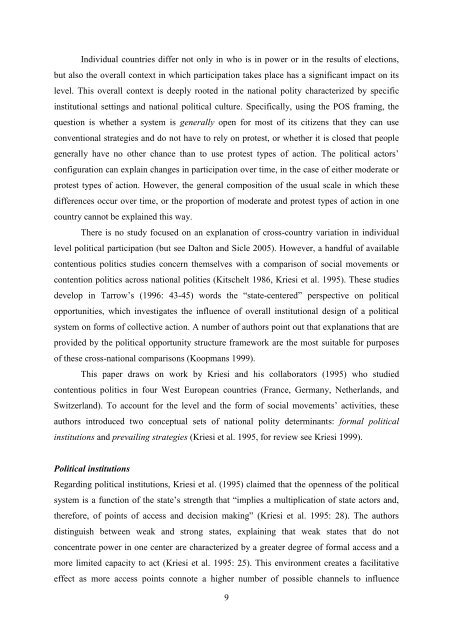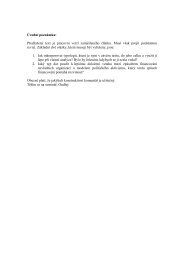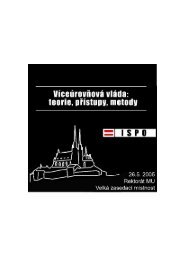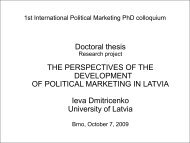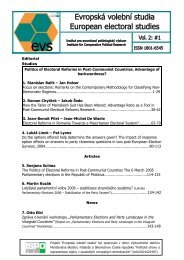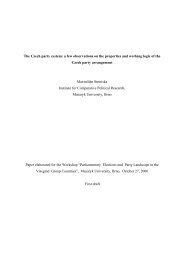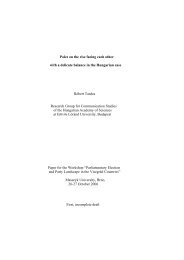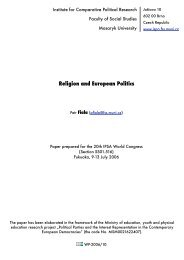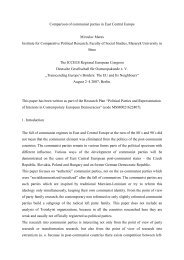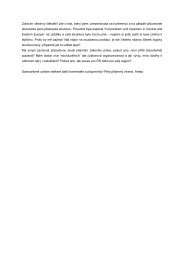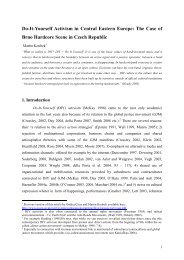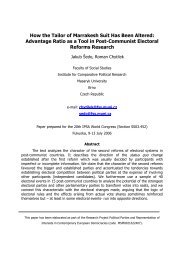CONTEXTUAL DETERMINANTS OF POLITICAL PARTICIPATION
CONTEXTUAL DETERMINANTS OF POLITICAL PARTICIPATION
CONTEXTUAL DETERMINANTS OF POLITICAL PARTICIPATION
Create successful ePaper yourself
Turn your PDF publications into a flip-book with our unique Google optimized e-Paper software.
Individual countries differ not only in who is in power or in the results of elections,but also the overall context in which participation takes place has a significant impact on itslevel. This overall context is deeply rooted in the national polity characterized by specificinstitutional settings and national political culture. Specifically, using the POS framing, thequestion is whether a system is generally open for most of its citizens that they can useconventional strategies and do not have to rely on protest, or whether it is closed that peoplegenerally have no other chance than to use protest types of action. The political actors‟configuration can explain changes in participation over time, in the case of either moderate orprotest types of action. However, the general composition of the usual scale in which thesedifferences occur over time, or the proportion of moderate and protest types of action in onecountry cannot be explained this way.There is no study focused on an explanation of cross-country variation in individuallevel political participation (but see Dalton and Sicle 2005). However, a handful of availablecontentious politics studies concern themselves with a comparison of social movements orcontention politics across national polities (Kitschelt 1986, Kriesi et al. 1995). These studiesdevelop in Tarrow‟s (1996: 43-45) words the “state-centered” perspective on politicalopportunities, which investigates the influence of overall institutional design of a politicalsystem on forms of collective action. A number of authors point out that explanations that areprovided by the political opportunity structure framework are the most suitable for purposesof these cross-national comparisons (Koopmans 1999).This paper draws on work by Kriesi and his collaborators (1995) who studiedcontentious politics in four West European countries (France, Germany, Netherlands, andSwitzerland). To account for the level and the form of social movements‟ activities, theseauthors introduced two conceptual sets of national polity determinants: formal politicalinstitutions and prevailing strategies (Kriesi et al. 1995, for review see Kriesi 1999).Political institutionsRegarding political institutions, Kriesi et al. (1995) claimed that the openness of the politicalsystem is a function of the state‟s strength that “implies a multiplication of state actors and,therefore, of points of access and decision making” (Kriesi et al. 1995: 28). The authorsdistinguish between weak and strong states, explaining that weak states that do notconcentrate power in one center are characterized by a greater degree of formal access and amore limited capacity to act (Kriesi et al. 1995: 25). This environment creates a facilitativeeffect as more access points connote a higher number of possible channels to influence9


